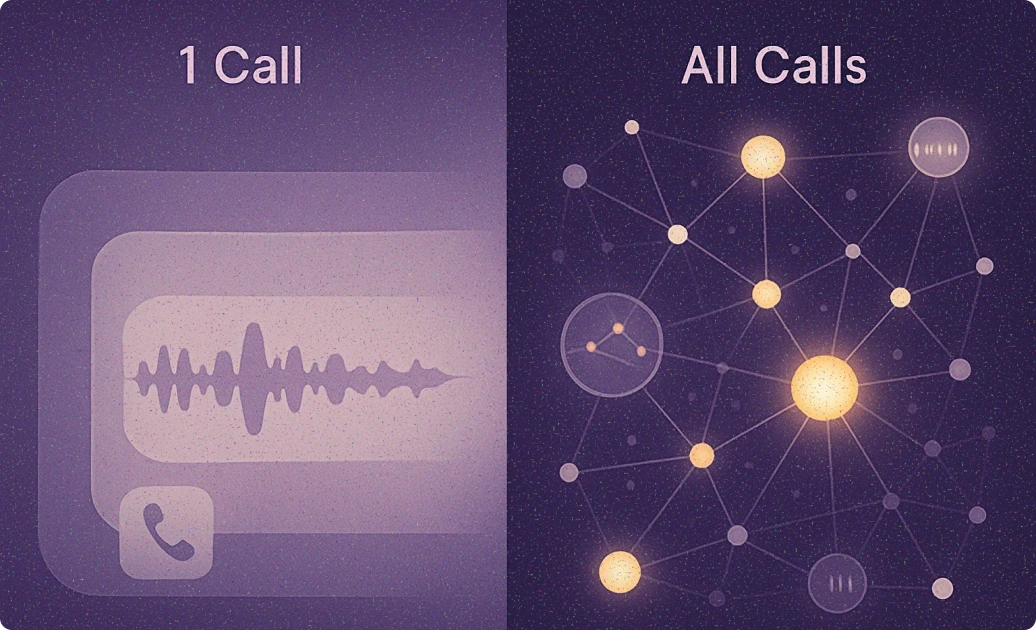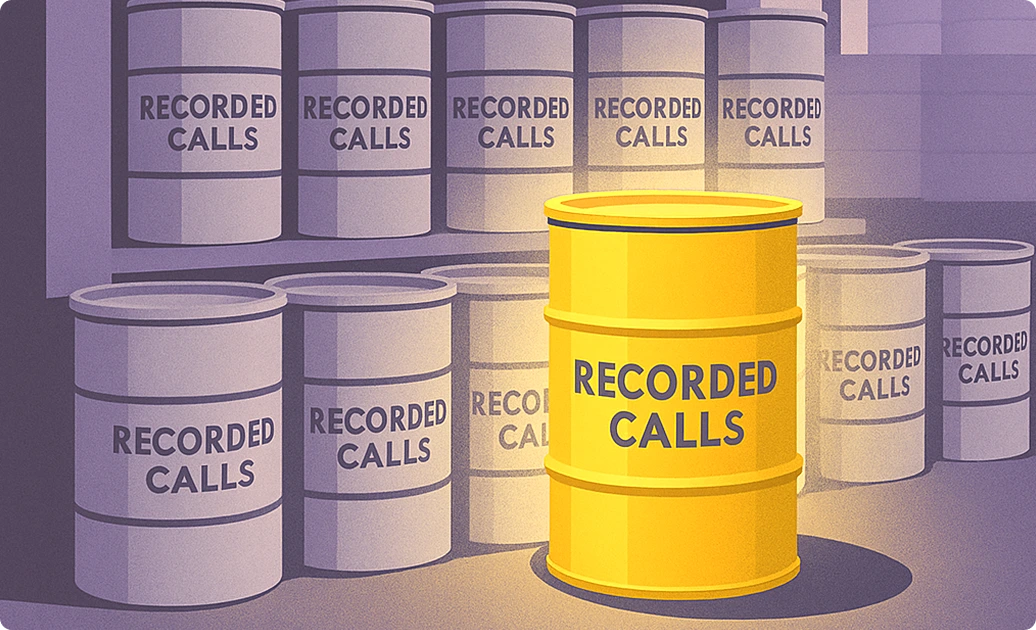Chatbots That Learn from Win-Loss Data to Coach Reps
-
Bella Williams
- 10 min read
Adaptive Sales Coaching is reshaping how sales representatives learn and grow, empowering them to reach their full potential. Imagine a scenario where every sales interaction is analyzed and transformed into actionable insights, guiding reps to refine their approaches. The advent of chatbots capable of processing win-loss data marks a turning point in coaching. These intelligent systems not only analyze past performance but also provide personalized feedback to enhance future sales efforts.
As the sales landscape evolves, adaptive coaching methodologies must evolve alongside. Chatbots can bridge the gap between traditional training and real-time, data-driven advice. By leveraging historical data, these digital coaches offer targeted strategies that align with each rep's unique challenges and strengths. Unlocking potential through adaptive sales coaching creates an environment where sales professionals are not just trained but continuously guided toward success.
Analyze & Evaluate Calls. At Scale.

Harnessing Win-Loss Data for Adaptive Sales Coaching
Harnessing win-loss data is essential for driving effective adaptive sales coaching. By analyzing the outcomes of sales interactions, teams can glean valuable insights about their approaches, strengths, and areas for improvement. Understanding why opportunities are won or lost allows sales managers to create targeted training that addresses specific challenges. This data-driven approach to coaching fosters continuous improvement among team members, adapting their strategies as market conditions and customer needs evolve.
Chatbots that learn from win-loss data can play a pivotal role in this process. They can provide real-time feedback to sales representatives, share best practices, and enhance training sessions based on current insights. Moreover, integrating these chatbots with existing systems streamlines the data analysis, enabling teams to respond faster to trends and shifts in customer behavior. In essence, harnessing win-loss data through adaptive sales coaching empowers sales teams to refine their skills and achieve higher success rates.
The Role of Win-Loss Analysis in Sales Improvement
Win-loss analysis plays a crucial role in enhancing sales performance through its focus on understanding why deals are won or lost. By systematically examining these outcomes, organizations can identify strengths, weaknesses, and opportunities within their sales processes. This invaluable feedback acts as a foundation for adaptive sales coaching, empowering sales teams to refine their strategies based on real-world experiences and insights.
Integrating the findings from win-loss analysis into sales coaching creates a continuous loop of improvement. Sales representatives learn from past interactions, adapting their approaches according to what has proven effective. This enhancement not only boosts close rates but also contributes to improved lead conversion and customer engagement. With adaptive sales coaching informed by win-loss analysis, sales teams are better positioned to respond dynamically to market changes, thereby driving sustainable growth and success in the competitive landscape.
How Chatbots Transform Win-Loss Data into Actionable Insights
Chatbots revolutionize the analysis of win-loss data by transforming intricate insights into clear, actionable strategies. When equipped with intelligent algorithms, these chatbots can streamline the tedious process of dissecting verbal and written feedback from sales interactions. This allows sales teams to identify patterns and trends that drive their results, helping to overcome traditional biases in data interpretation. Rather than sifting through mountains of notes and recordings, bots can extract essential themes that inform better sales tactics.
By converting qualitative feedback into quantifiable actions, chatbots foster a culture of continuous improvement within sales organizations. They can automatically suggest enhancements based on real data, ensuring that sales reps receive tailored recommendations. This process of deriving actionable insights from win-loss data ultimately supports adaptive sales coaching, empowering representatives to refine their approach and improve performance effectively. Embracing this technology enables teams to pivot quickly, react to market demands, and build stronger connections with their prospects.
Extract insights from interviews, calls, surveys and reviews for insights in minutes
Implementing Adaptive Sales Coaching Chatbots
Implementing adaptive sales coaching chatbots requires a structured approach to ensure effectiveness and integration within existing systems. Begin by identifying the right data points that capture critical sales interactions. This foundational step enables the chatbot to learn from historical win-loss data, gaining insight into customer preferences and successful sales strategies.
Next, integrate the chatbot seamlessly with your CRM systems. This ensures that the chatbot has access to relevant sales data and can provide real-time feedback to sales representatives. Proper integration allows the chatbot to act as a valuable resource during sales calls, helping reps pivot strategies based on insights and customer engagement trends.
Lastly, invest time in training the chatbot to enhance sales performance. This involves continuous learning from interactions and feedback on past calls. By utilizing these steps, organizations can successfully implement adaptive sales coaching chatbots, transforming the sales coaching experience and empowering teams to achieve better outcomes.
Step-by-Step Guide to Deploying Chatbots for Sales Teams
Deploying chatbots for sales teams is a transformative process that enhances Adaptive Sales Coaching. To begin, it is essential to identify the right data points. This includes analyzing win-loss data to uncover insights into successful sales strategies and areas needing improvement. By understanding these data points, the chatbots can be effectively programmed to offer tailored coaching that directly addresses the specific needs of sales representatives.
Next, integrating the chatbots with existing CRM systems ensures seamless communication and data flow. This integration allows chatbots to access real-time information and deliver insights precisely when sales reps need them. Finally, training the chatbots is crucial. Continuous learning from both successful and unsuccessful sales interactions will enable these chatbots to refine their coaching strategies and support sales teams dynamically, ultimately driving better performance and results.
- Step 1: Identifying the Right Data Points
Identifying the right data points is crucial for adaptive sales coaching. To effectively utilize chatbots in coaching, it’s essential to first pinpoint the specific data that will drive insights. Begin by analyzing win-loss data to understand recurring themes, such as customer pain points and desires. Capturing these aspects allows the chatbot to deliver personalized coaching based on real interactions, enhancing the learning experience for sales reps.
Next, consider the metrics and behaviors that signify success or failure, such as engagement rates and feedback sentiments. By categorizing this data—like manual processes and ineffective measurements—the chatbot can identify patterns and areas for improvement. Ultimately, clearly defining these key data points will empower the chatbot to provide tailored recommendations, making the coaching process more relevant and impactful for each representative. This strategic approach ensures that your adaptive sales coaching initiatives are not only based on data but are also aligned with actual market needs.
- Step 2: Integrating Chatbots with CRM Systems
Integrating chatbots with CRM systems is a pivotal step in enhancing sales performance through adaptive sales coaching. By seamlessly connecting chatbots to CRM platforms, organizations can ensure that sales representatives receive real-time insights derived from win-loss data. This integration allows chatbots to access essential customer interactions, thus transforming raw data into actionable coaching points that can assist reps in refining their sales techniques.
When chatbots are integrated with CRM systems, several advantages emerge. First, they can consistently analyze past sales interactions, helping to pinpoint what strategies succeeded or failed. Second, this integration enables chatbots to provide tailored responses to customer queries based on historical data, ensuring a more personalized customer experience. Finally, sales representatives can receive ongoing training and support through automated guidance from chatbots, empowering them to navigate complex sales scenarios more effectively. This process fosters a culture of continuous learning and adaptation within sales teams.
- Step 3: Training Chatbots to Enhance Sales Performance
Training chatbots effectively enhances sales performance by integrating learnings from win-loss data. This adaptive sales coaching process involves refining chatbot algorithms based on real interactions, enabling them to provide personalized responses. First, it’s essential to analyze the win-loss data comprehensively. This analysis reveals key areas where sales representatives excel or struggle, and the insights gathered serve as the foundation for chatbot training.
Next, the chatbot must undergo iterative learning cycles using this data. By simulating various sales scenarios and leveraging feedback, the chatbot can adapt its coaching techniques and advice. Additionally, regular assessments on chatbot effectiveness ensure it evolves with changing sales strategies and market conditions. Ultimately, this approach not only boosts the close rates but also cultivates a deeper understanding of customer engagement, making adaptive sales coaching a powerful tool for driving revenue growth.
Top Tools for Adaptive Sales Coaching Chatbots
Adaptive sales coaching chatbots are becoming essential tools for enhancing sales effectiveness. These chatbots utilize win-loss data to provide real-time insights, helping sales representatives refine their approaches. As organizations shift away from traditional sales tactics, they can benefit significantly from implementing chatbots tailored for coaching.
The top tools for these chatbots include platforms like insight7, which is known for its comprehensive data analysis capabilities. Drift offers an AI-powered conversational approach, making customer interactions more engaging. Conversica specializes in nurturing leads, while Chorus.ai focuses on conversation intelligence, extracting valuable insights from sales calls. Lastly, Gong harnesses revenue intelligence to provide feedback based on real conversations. Leveraging these tools allows businesses to optimize their sales strategies and improve outcomes through effective adaptive sales coaching.
- insight7: Comprehensive Win-Loss Data Analysis and Coaching
With the increasing complexity of sales processes, employing comprehensive win-loss data analysis becomes essential for businesses seeking to refine their strategies. This analysis not only highlights why deals are won or lost but also sheds light on customer preferences, competitive positioning, and market trends. By integrating this information into adaptive sales coaching, organizations empower their sales teams with real-time insights that guide conversations, leading to higher closure rates.
In this dynamic environment, chatbots play a pivotal role in transforming raw win-loss data into actionable feedback. They collect insights continuously and provide tailored coaching to sales representatives, ensuring they can adapt their approach based on recent experiences. As a result, sales reps become more adept at identifying customer pain points and adjusting their strategies accordingly. This process evolves into a cycle of perpetual learning, wherein sales teams receive ongoing support, further enhancing their effectiveness and productivity.
- Drift: AI-Powered Conversational Sales Tool
AI-powered conversational sales tools have become essential in enhancing sales coaching, and Drift stands out in this arena. By utilizing AI, Drift analyzes win-loss data to tailor conversational strategies to each salesperson's unique strengths and weaknesses. This adaptive sales coaching provides real-time insights, allowing sales representatives to refine their techniques based on past interactions and customer feedback.
The integration of Drift transforms traditional sales methods by making them more interactive and personalized. AI analyzes recorded conversations, identifying key patterns that indicate successful or unsuccessful outcomes. This data-driven approach enables sales reps to learn effectively from their experiences, coaching them in real-time and empowering them to adjust their pitches on the fly. Consequently, Drift not only improves individual sales performance but also enhances overall team efficiency through consistent learning and development.
- Conversica: Sales Assistant for Engagement and Nurturing
As organizations seek to improve customer engagement and nurturing, leveraging an intelligent sales assistant can be transformative. This technology excels in maintaining ongoing communication with prospects, ensuring no lead goes unattended. By analyzing both win and loss data, the assistant becomes adept at offering personalized interactions, enhancing the overall sales experience.
Utilizing such a sales assistant comes with key benefits. First, it allows sales teams to focus on more engaged leads while nurturing others through tailored follow-ups. Second, it provides critical insights to representatives, helping them understand what strategies work best in specific scenarios. Finally, the assistant continuously evolves, learning from rep interactions to provide increasingly effective coaching. This adaptability makes it a superb tool in the journey toward adaptive sales coaching, creating a robust support system for sales teams.
- Chorus.ai: Conversation Intelligence Platform
The Conversation Intelligence Platform serves as a cornerstone for significantly enhancing sales coaching. It collects and analyzes dialogues from various sales interactions, providing invaluable insights into customer behavior and preferences. By utilizing advanced algorithms, this platform transforms raw conversation data into actionable knowledge that can guide sales representatives toward improved performance.
Moreover, the platform enables teams to identify patterns within win-loss data and derive coaching strategies tailored to individual needs. This process not only enhances the quality of sales conversations but also significantly optimizes training efforts. Participants can engage with ease, as the interface is designed for everyone, not just data experts. Overall, the Conversation Intelligence Platform plays a crucial role in facilitating adaptive sales coaching, driving sustained growth and higher conversion rates.
- Gong: Revenue Intelligence that Leverages Sales Calls
Revenue intelligence tools play a pivotal role in enhancing sales effectiveness by analyzing sales calls to extract valuable insights. By focusing on win-loss data, these tools enable sales teams to understand the nuances behind their success or failure. This deep analysis allows for the development of strategies that can better align with customer needs and preferences. Engaging with potential customers through a more consultative approach transforms conventional sales tactics into meaningful conversations.
With the integration of AI-driven platforms, organizations can rapidly assess sales calls and gather instant feedback. This capability fosters a culture of continuous improvement, where sales reps receive tailored coaching based on real interactions. Embracing revenue intelligence not only empowers teams with data-driven decisions but also cultivates a learning environment, ultimately leading to improved sales performance and customer satisfaction. Through adaptive sales coaching, organizations can navigate the complexities of the sales process and achieve lasting success.
Conclusion: Elevating Sales Outcomes with Adaptive Sales Coaching Chatbots
Adaptive sales coaching chatbots have the potential to revolutionize sales outcomes by transforming win-loss data into valuable insights. By analyzing historical performance and understanding the factors that lead to success, these chatbots can offer personalized coaching to sales representatives. This targeted support enables teams to refine their techniques, ultimately boosting win rates and increasing average ticket prices.
The strategic integration of adaptive sales coaching chatbots empowers organizations to enhance their training methodologies effectively. Through real-time feedback and tailored learning paths, sales reps can adapt quickly to market demands and customer needs. Implementing these innovative tools not only drives individual development but also elevates overall team performance, resulting in measurable success across the sales organization.







